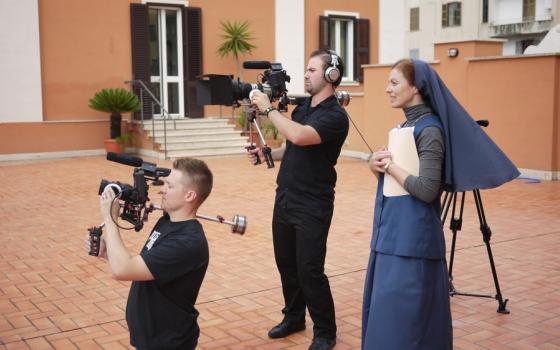Filming took seven years, two trips to Italy, crashing a Pauline bus pilgrimage, getting kicked out of St. Paul Outside-the-Walls in Vatican City and a number of reported miracles. But on Oct. 25, the Daughters of St. Paul and Spirit Juice Studios finally premiered their 90-minute documentary, "Media Apostle," at the Gene Siskel Film Center in Chicago.
"Media Apostle" tells the story of Blessed Fr. James Alberione, founder of the Pauline Family of 10 congregations and institutes of religious and laypeople, including the Society of St. Paul and the Daughters of St. Paul. The documentary can be viewed online and soon will be aired on EWTN, according to Sr. Helena Burns of the Daughters of St. Paul.
Burns, who lives with the sisters in Toronto, wrote and directed "Media Apostle," her first film. She talked to Global Sisters Report about why she wanted to make the film, what it took to bring it to life and what Alberione has to say to us today about our media use.
GSR: Where did the idea for the film "Media Apostle" come from?
Burns: I love our founder, and I wanted to tell his story.
I was writing a feature film, and one of our sisters calls me up and says, 'There's a producer [Friar John Clote] here. He's doing saint movies like you are. You have to come meet him.'
Thank God I did. He said, 'Sister, don't do a feature film. It's going to cost millions of dollars. Do a documentary, get [Alberione] known, then maybe someday you can do your feature film.' So I said OK. He coached me all the way through — so gracious.
I was trained in feature film writing at UCLA, but I realized documentary was more doable and practical and did get made.
Where did you first hear about Alberione and the Pauline Family?
I had this big conversion experience at 15, met God and shortly after that — like four days after meeting God — he called me to be a sister.
I was writing to all these different orders, and I found a little ad for the Daughters of St. Paul. I loved media, and I loved to write, so I thought this could be a good way to help people. The Daughters kept sending me all kinds of information. They sent me holy cards and pamphlets about Alberione. Every time, I'd be like, 'I'm not going to be a nun.' I'd chuck all the religious order material in the garbage, but I never threw any Alberione stuff out.
He's so unique. There's no technological media saint like him. It seems like every order has a publishing house or a media arm, but that's not what the Daughters were founded for as their sole mission. So I just fell in love with this guy. He has these pithy little sayings that get under your skin, like little wisdom bombs.
So basically like tweets?
Yeah! He mastered the tweet before Twitter. He was brief — brevity was his thing. Super brief.
How did you go from admiring Alberione to joining the Daughters of St. Paul?
I kept going up and down in my discernment, but I said, "I'm always going to pray to this saint."
I entered the Daughters of St. Paul at 17, so I needed my parents' permission. I get this phone call from a sister: "We're going through the files, and we just wanted to know if you're still interested in religious life." And I said, "Yeah, but my parents won't let me for a few years, and it's going to be a while."
She lied. She said, "We're going to be in the area on Saturday. Would you like us to drop in and talk to your parents?" I said, "Please come!" So they stopped by, and that helped the ball get rolling.
She told me later what had happened. That day, she was calling girls and going through the files, and all of them were dead, married, moved, didn't want to be a nun anymore, left the church. And she had a little holy card of Father Alberione, and she said to him, "You give me the next one," and she pulled my name out.
So we've had this connection for a long time, and I feel so privileged and honored to be the one to tell his story.
What did it take to get this movie made?
We started some online fundraising. We approached some of our friends. The Floods [of Chicago's Flood Brothers Disposal/Recycling Services] are big benefactors. People were incredibly generous, and if you saw "In memory of Janet Parsons" at the end of the movie, that was a $20,000 donation. [Parsons' daughter] called me up and said, "So, Sister, how much more do you need?" I said, "15 grand." She goes, "How about 20? This is too funny. My mom converted to Catholicism on her deathbed, and now her name is going to be forever in this movie."
We had so many signs God really wanted the film.
How did digging into Alberione's life change the way you thought about him or the way you approached making film?
Well, I'm very print-heavy, word-heavy, text-heavy, because that's what I love and I do very well, and he was, too. He started out in newspapers and everything. But his whole thing was you gotta be where the people are.
One thing: When I was going through all the photos of him, his biggest smile was when he was around technology — when he was blessing the machines.
Obviously, media has continued to evolve since Alberione died. What do you think he would say about social media, and what can that tell us about how to approach social media?
I think he wouldn't be addicted. This is a great, great concern of mine. And it's not just young people: You see plenty of adults who cannot put that thing down and are just so distracted. It's the age of distraction, right?
It's more than a tool, it's a milieu that we're living in. That's a whole media literacy thing. We understand that these aren't just tools anymore. It's a culture. It's the way that we live our lives. But we have to step back and take the reins and have a plan and have a strategy.
I think Father Alberione would have a strategy. He would always have a plan, starting with: What is the nature of this new media? How can we use it? He would use media in the optimal way. He would find the best way to use this media, which doesn't mean using it all the time, necessarily. So Alberione would find a way to integrate all the new technology into his life, but he wouldn't let it take over his life. He wouldn't let virtual reality take over actual reality. Everything in its place.
Alberione would say absolutely use it, but use it optimally, which means retain your humanity. Don't lose your humanity.
[Emily McFarlan Miller is an award-winning freelance journalist and social media consultant based in Chicago. Her website is emmillerwrites.com.]

